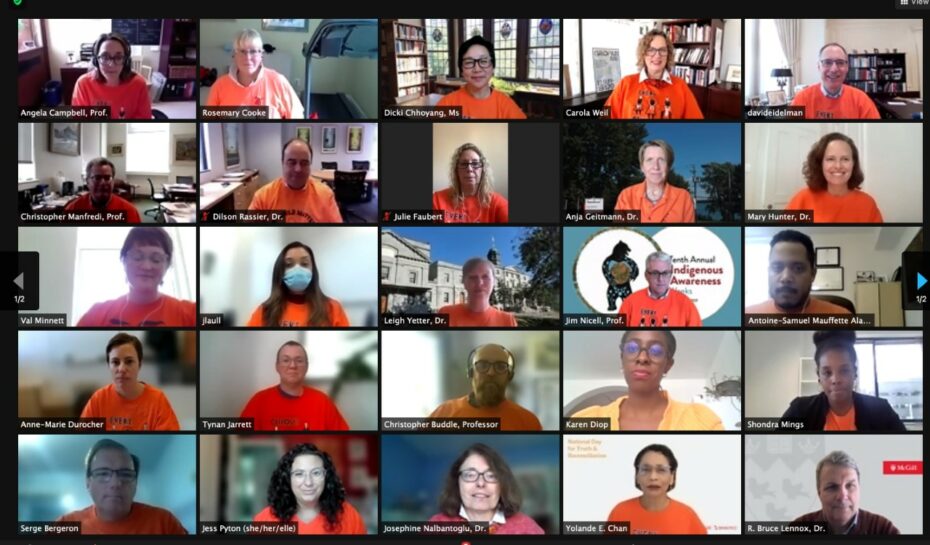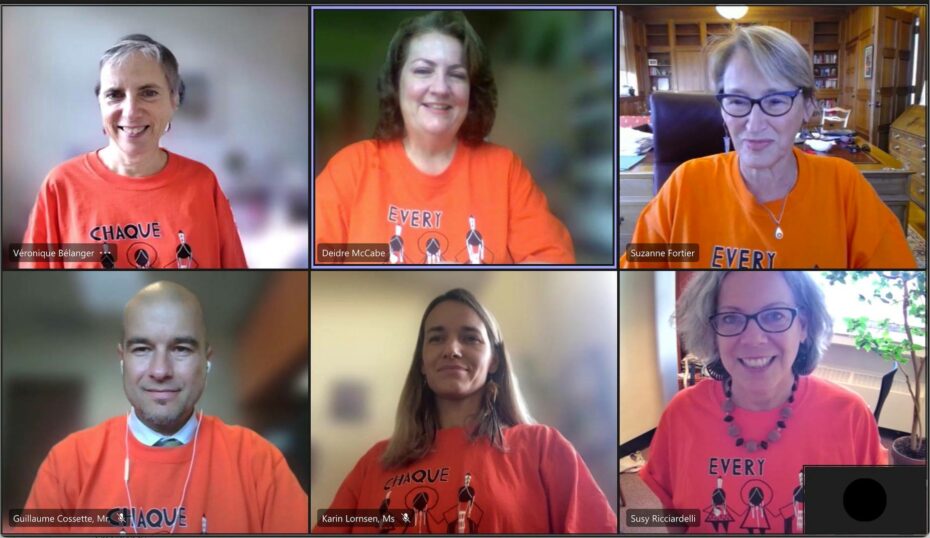
Today, on the first National Day for Truth and Reconciliation, Canadians across the country are honouring the survivors of residential schools, their families and communities, and those children who died there.
It is the latest display in a groundswell of support for Indigenous people. And while heartening, it begs the question: What does it mean to be an Ally to Indigenous people?
When faced with that exact question, Terry David Young smiles patiently.
“I get asked this a lot,” says Young, a Wolastoqiyik (Maliseet) from Kingsclear First Nation in New Brunswick. “Since I’ve started at McGill, I’ve been sharing what it means to be respectful, understanding, culturally appropriate and all of those things. But in the end, it comes down to what you [non-Indigenous people] think and not what I think you should think.”
Making a true commitment to allyship
For Young, the Indigenous Student Advisor at First Peoples’ House, this is an important exercise for non-Indigenous people to take a deep and honest look into themselves.
“In the end, if I tell you something that you are just going to repeat to support us, what good is that? Can you say that you’ve learned enough [about Indigenous history and culture]? Can you say that you’ve done enough research and educated yourself? This exercise isn’t meant for us. This is meant for you. What will you do to help us move forward toward reconciliation?”
‘This exercise’ is the new I Am an Ally section on the Indigenous Initiatives webpage. Members of the McGill community are encouraged to “affirm their allyship” by answering three questions which will be posted on the message board:
- What does Reconciliation mean to you personally?
- What do you think is needed for Reconciliation to succeed?
- What is your personal pledge of action(s) to take part in that process of Reconciliation?
The message board only went live a few days ago and already has over 30 pledges of support, from students, staff, faculty, administration and even a prospective student.
“This goes beyond saying ‘I am sad and I support you,” says Dicki Chhoyang, Interim Director, Indigenous Initiatives. “The important part is committing to what you are going to do.”
“For me, being an Ally means a lot of listening, a lot of learning and a lot of humility. It means amplifying what you are hearing,” she says. “I am listening and trying to understand what are the visions and hopes of Indigenous people and figuring out what concrete actions I can take to support them?”
Education is key
Education is a recurring theme for both Young and Chhoyang. They are not alone.
“The Final Report of the Truth and Reconciliation Commission (TRC) reminds us that ‘reconciliation is not possible without knowing the truth.’ These words have particular resonance for an institution and a community dedicated to the pursuit of learning and knowledge,” said Provost Christopher Manfredi in his message to the McGill community earlier today. “McGill University recognizes the shared responsibility to ensure that the experiences of the victims and survivors of the residential schools are known and never forgotten. We likewise have the responsibility to address historical and contemporary systems of oppression, to acknowledge the errors of our own past and of our founders, and to forge a better, more inclusive future. The imperatives expressed in the Calls to Action of the TRC and in McGill’s own 52 Calls to Action continue to guide our progress in these respects.”
A great starting point for people looking to further educate themselves on Indigenous history and cultures is the Resource Hub section of the Indigenous Initiatives website. There people can find information on everything from residential schools, to the Indigenous lands upon which McGill University is installed. There are resources for Indigenous members of the McGill community, researchers and even an Allyship section.
“We created that section when the first graves were found in the Kamloops Indian Residential School and have been building it up since,” says Chhoyang. “Self-education is a key element because there is just so much to learn. We wanted to offer the McGill community access to curated resources within our site.”
An every-day commitment
Being an Ally to Indigenous people shouldn’t be a once-a-year commitment, says Chhoyang, noting that McGill’s commitment is ongoing and ever-evolving. “There are 52 calls to Action in five categories,” she says. “Virtually everyone at the University will be affected one way or another. The University is committed to moving forward in partnership with Indigenous communities.”
For Young, the resolve of Allies must match that of Indigenous people. He speaks of the outpouring of grief and anger when the unmarked graves of 215 children were found at the Kamloops Indian Residential School, and the show of support by non-Indigenous people.
“But it isn’t 215 children any more, it’s close to 7,000. We just don’t hear it on the news anymore,” he says. “My husband says white people in his circle of friends are saying ‘OK, we’ve done this already, we’re tired of feeling bad and we don’t want to feel bad anymore.’ But this is how we feel all the time and it doesn’t go away just because it isn’t in the news.
“This is not just one day of reflection for us. It really is day-in and day-out trying to pick up the pieces of our lives that have been utterly destroyed.”


Pour moi, le fait que les Canadiens commencent à prendre conscience et à reconsidérer les peuples autochtones, leurs cultures, leur connaissance du territoire et leurs croyances contribue à enrichir non seulement notre patrimoine, mais aussi notre intelligence collective. La réconciliation avec les peuples natifs du Canada nous ramène vers l’essentiel et vers une communion plus pure avec la nature qui nous entoure et nous nourrit. Bien que leurs connaissances aient pu s’estomper dans le temps avec l’assimilation, les peuples autochtones ont beaucoup à apprendre aux non-autochtones, notamment en ce qui a trait à la lutte aux changements climatiques où la… Read more »
I would like to know how McGill, as a land owning institution (housing, commercial, not just the occupied university land) will be a community leader and help the existing indigenous people who are experiencing homelessness, have no access to dignified sanitary facilities, etc. around campus. Just walk from Milton to Sherbrooke through Parc in case you don’t know what I mean. Let’s not JUST remember the past while putting blinders on the present.